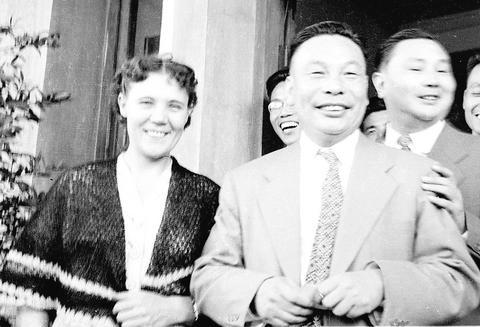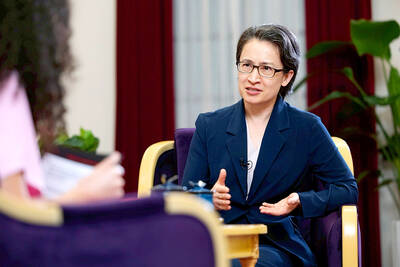Faina Chiang Fang-liang (蔣方良), widow of Chiang Ching-kuo (蔣經國) and first lady of the Republic of China on Taiwan from 1978 to 1988, died yesterday at 12:40pm.
She died of respiratory failure brought on by lung cancer at age 88. But for her title of first lady, most in Taiwan know little of her. Unlike her predecessor, Soong Mayling (蔣宋美齡), who glittered both on the domestic and the international stage, Chiang Fang-liang was always a first lady in the shadows.

PHOTO: AP/CNA
Born Faina Epatcheva Vahaleva in Sverdlovsk, Siberia (now Ekateringburg, Russia), Vahaleva was orphaned at a young age and raised by her older sister Anna. An outspoken member of the Communist Youth League, Vahaleva met Chiang Ching-kuo at the age of 16 at the Ural Heavy Machinery Plant in Siberia, where Chiang was working in exile after his father, Chiang Kai-shek (
Vahaleva married Chiang Ching-kuo two years after they met, on March 15, 1935. Their first son, Hsiao-wen (孝文) was born in December 1935. The couple had two more sons, Hsiao-wu (孝武) and Hsiao-yung (孝勇) and a daughter (孝章).
Not long after the couple's marriage, Chiang Ching-kuo's reserve communist party member status was cancelled and he was not allowed to work. Vahaleva became the sole bread-winner for the family of three.
In early 1937, relations between China and the USSR eased. Stalin dramatically allowed Chiang to return to China. Perhaps Vahaleva had thought little of the different language, culture and traditions in China that would no doubt be a great barrier to her, or perhaps her love for her husband gave her all the courage needed. In any case, the Russian bride followed her husband to China.
Chiang Kai-shek was reportedly at first dismayed to have a Communist Russian daughter-in-law. But after the two met, Vahaleva -- who has been described as possessing the virtues of a traditional Chinese woman to a greater degree than a Chinese woman -- soon won the approval of her father-in-law and was given the name Fang-liang.
Chiang Fang-liang stayed behind to live with Chiang Ching-kuo's mother, Chiang Kai-shek's first wife, Mao Fu-mei (
Perhaps it was because of self-consciousness regarding her Mandarin -- with her Russian accent and Ningbo dialect -- that when Chiang Ching-kuo later became president, Fang-liang was often anxious about appearing in public.
If the traditional role of First lady was to be the silent shadow behind the president, Fang-liang filled it perfectly. Throughout her husband's political career, she stayed out of the public spotlight.
Little was ever known of her, except for her modest and simple lifestyle. She even exhibited the habits of a peasant housewife. She was used to doing all the household chores herself instead of employing servants. She would ask for her husband's approval for everything. Private household expenses, such as water and electricity bills, as well as salaries for servants, were all paid directly by Fang-liang from Chiang Ching-kuo's paycheck, instead of being deducted as public expenses.
Once a subordinate suggested to her, "everyone else deducts these as public expenses, why don't you let me handle them?"
Fang-liang replied that she had to ask her husband first, and called back a few days later saying, "No. He said no. We have to pay these ourselves."
Fang-liang mastered English after coming to Taiwan, and her fluency enabled her to access world news and events through English publications -- which probably limited her knowledge of her husband's affair with Chang Ya-ruo (
After Chiang Ching-kuo died, Fang-liang reportedly asked her second son Hsiao-wu, "I only have three sons, why are there reports saying I have five?"
Hsiao-wu, who had publicly reconciled with his half-brother Chang Hsiao-yan (章孝嚴/John Chang) chose to respond with silence.
The affair Chiang Ching-kuo had with Chang Ya-ruo occurred around 1940, and she bore him two sons: Hsiao-yan and Hsiao-tzu (孝慈).
No one, not even Hsiao-wu, knew if Fang-liang was aware of her husband's past romance with Chang Ya-ruo, but no one wanted to destroy the image of Chiang Ching-kuo in Fang-liang's heart.
Her old age was beset by ill-health, including heart disease, diabetes and chronic obstructive pulmonary disease, and the tragic loss of first her husband, then her sons. Chiang Ching-kuo passed away in 1988. Of her three sons, Hsiao-wen died in in 1989, Hsiao-wu in 1991 and Hsiao-yung in 1996.
Her health further deteriorated four years ago with the discovery of a tumor in the upper part of her left lung. When she underwent an X-ray examination on Dec. 6, fluid was discovered in her left lung. After being plagued by ill-health for over 10 years, Chiang Fang-liang's heart finally ceased beating at 12:10pm yesterday at Taipei Veterans General Hospital.
Few first ladies in history stand out as being influential. Soong Mayling of the ROC, the US' Hilary Clinton and Eva Peron of Argentina are perhaps exceptions, but unlike them, Chiang Fang-liang endured a life away from her home country, and coped with being placed in the awkward position of being the first lady of an anti-communist nation when her own country was the proselytizer of world communism. And she lived out her final years alone, with her remaining daughter living in the US and most of her friends having passed away.
Chiang Fang-liang lived her life with the weighty crown of first lady. While she never enjoyed the glamour associated with the title, she will be remembered for her stoicism.

Temperatures in northern Taiwan are forecast to reach as high as 30°C today, as an ongoing northeasterly seasonal wind system weakens, the Central Weather Administration (CWA) said. CWA forecaster Tseng Chao-cheng (曾昭誠) said yesterday that with the seasonal wind system weakening, warmer easterly winds would boost the temperature today. Daytime temperatures in northern Taiwan and Yilan County are expected to range from 28°C to 30°C today, up about 3°C from yesterday, Tseng said. According to the CWA, temperature highs in central and southern Taiwan could stay stable. However, the weather is expected to turn cooler starting tonight as the northeasterly wind system strengthens again

The Ministry of Foreign Affairs (MOFA) yesterday expressed “grave concerns” after Singaporean Prime Minister Lawrence Wong (黃循財) reiterated the city-state’s opposition to “Taiwanese independence” during a meeting with Chinese Premier Li Qiang (李強). In Singapore on Saturday, Wong and Li discussed cross-strait developments, the Singaporean Ministry of Foreign Affairs said in a statement. “Prime Minister Wong reiterated that Singapore has a clear and consistent ‘one China’ policy and is opposed to Taiwan independence,” it said. MOFA responded that it is an objective fact and a common understanding shared by many that the Republic of China (ROC) is an independent, sovereign nation, with world-leading

COOLING OFF: Temperatures are expected to fall to lows of about 20°C on Sunday and possibly 18°C to 19°C next week, following a wave of northeasterly winds on Friday The Central Weather Administration (CWA) on Sunday forecast more rain and cooler temperatures for northern Taiwan this week, with the mercury dropping to lows of 18°C, as another wave of northeasterly winds sweeps across the country. The current northeasterly winds would continue to affect Taiwan through today, with precipitation peaking today, bringing increased rainfall to windward areas, CWA forecaster Liu Pei-teng (劉沛滕) said. The weather system would weaken slightly tomorrow before another, stronger wave arrives on Friday, lasting into next week, Liu said. From yesterday to today, northern Taiwan can expect cool, wet weather, with lows of 22°C to 23°C in most areas,

DEFENDING FREEDOM: Taiwanese love peace and helping others, and hope to be a positive force in the world, Vice President Hsiao Bi-khim told ‘Weltspiegel’ Taiwan is making every effort to prevent war in the face of China’s hybrid coercion tactics and military threats, Vice President Hsiao Bi-khim (蕭美琴) said in an interview with German public broadcaster ARD’s program Weltspiegel that aired on Monday. Taiwan is not seeking provocation or intending to disrupt international order, but “must possess the capacity for self-defense,” a news release issued by the Presidential Office yesterday quoted her as saying. Taiwan is closely watching not only the increasing scope and frequency of Chinese military exercises around the nation, but also Beijing’s hybrid and cognitive warfare tactics, including manipulating public opinion, fostering